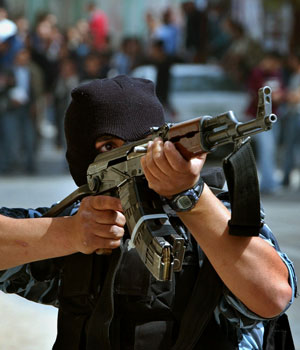
A Palestinian police officer aims his rifle during a gun battle with Palestinian gunmen on the road leading to the Erez crossing,between the Gaza Strip and Israel, near the village of Beit Hanoun March 20, 2006 (AP)
GAZA CITY, Gaza Strip (AP) – Hamas got a taste of the Gaza chaos and violence awaiting it after its newly named Cabinet takes office, when gunmen from the rival Fatah stormed government installations in five different locations.
The Monday outburst underlined the difficulties the Islamic group will face internally, in addition to likely international sanctions because Hamas is considered a terror group.
At the same time, Israel opened the main cargo crossing into Gaza for about 25 minutes to allow entry of badly needed food supplies. Shortages have developed in Gaza because the crossing has been closed for most of the past two months. Israelis and Palestinians blame each other.
Israel’s Army Radio reported the crossing might be opened again Tuesday.
Armed Fatah gangs have been storming Palestinian government buildings for months, but Monday’s was the largest outbreak. There were five separate incidents of violence in a single day. No one was killed, but 23 people were wounded.
The issue is jobs. In poverty-stricken Gaza, where an inflated Palestinian bureaucracy has provided money for thousands of families, Hamas is pledging reforms. That means eliminating jobs, firing workers. Fatah loyalists are truly fearful for their livelihood.
In an assault witnessed by an AP reporter, 30 Fatah gunmen, most of them wearing masks, burst into the government compound in Gaza City, firing rifles.
Minutes later, scores of police charged into the compound to root out the invaders, setting off a 25-minute gunbattle that sent foreign ministry employees diving under their desks, shattered windows and air conditioners, and left two unarmed security guards injured by stray bullets.
Police fanned out throughout the compound as a gunbattle erupted. Some gunmen ran through a street between the finance ministry and the foreign ministry, where an AP reporter was at the time. Others jumped onto the two-meter (six-foot) wall around the compound.
Suddenly, a short burst of gunfire from outside smashed through the building’s windows. Two bullets hit a security guard in the legs, just meters (yards) from where the AP reporter was standing. “I need an ambulance. I need an ambulance,” the wounded man screamed. He was brought to a hospital for treatment.
A second nearby guard was wounded in the arm by shrapnel. The room filled with the acrid odor of gunpowder and the sticky smell of blood.
Before the Jan. 25 parliamentary elections, the Fatah Party of President Mahmoud Abbas promised security jobs to a host of militants linked to the organization. Since Fatah’s electoral defeat, the militants have repeatedly raided government buildings demanding those jobs. Other Fatah activists who already have government positions, including nearly 60,000 members of the security forces, fear they will be fired. Besides its pledged reforms, Hamas may be forced to lay off tens of thousands of workers if the international community follows through with its threats to cut off aid to the government once the militant group assumes power.
Israeli Foreign Minister Tzipi Livni told Israel TV on Monday that most countries have laws against dealing with or giving money to terrorist regimes, and that would mean “that the international community will stop the processes with the Hamas.” Incoming Palestinian Finance Minister Omar Abdel Razek said reforming the security forces will be difficult but necessary. “They have to be targeted. Most of the corruption is within the security forces,” he said.
Early Monday, gunmen blocking a road leading to the main Israel-Gaza crossing point got into a gunfight with police who tried to remove them. Two dozen gunmen also briefly infiltrated Gaza’s power plant, exchanging fire with police, officials said. Gunmen also briefly entered a military hospital near the central Gaza city of Khan Younis, and militants and police engaged in a gunbattle outside a police compound.

Senior Hamas leader and incoming Minister of Foreign Affairs Mahmoud al-Zahar (C) attends the weekly session of Palestinian parliament in Gaza, March 21, 2006 (REUTERS)

Palestinian policemen take up position during exchange of fire with Palestinian gunmen after they blocked a main Gaza road, March 20, 2006 (REUTERS)
